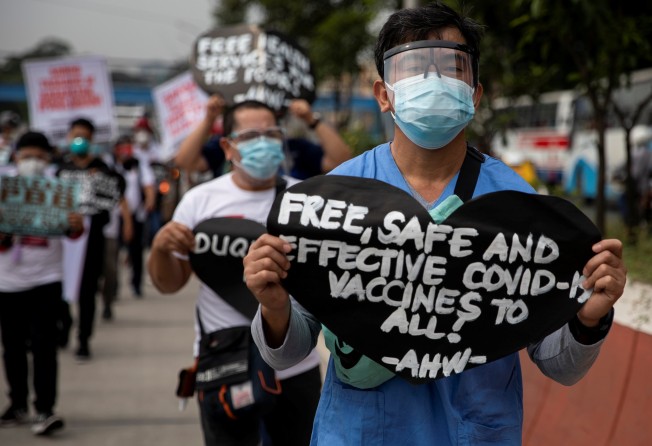
09:50
SCMP Explains: What's the difference between the major Covid-19 vaccines?

As vaccination drives roll out across the world, there is increasing awareness that vaccines are not a silver bullet for resolving the global pandemic. First, there are many people who do not like vaccinations, and as long as Covid-19 lurks, the vaccinated will not be 100 per cent protected.
Second, the vaccines are being very unfairly distributed. As public-health expert Gavin Yamey observed in Nature magazine earlier this week:
“As I write this, 191 million vaccination shots against Covid-19 have been administered; more than three quarters were given in just 10 nations that account for 60 per cent of the global gross domestic product. In some 130 nations with 2.5 billion people, not a single shot has been administered. High-income countries represent only 16 per cent of the world’s population, but they have purchased more than half of all Covid-19 vaccine doses.”
Third, with so much change happening so quickly, we do not even know if normal can return: Covid-19 is mutating as quickly as vaccines are being innovated.
Given the complexity, let us draw some simple, common-sense lessons on what to do next.
First, change is happening so quickly that even the experts could be wrong. Relying on medical expertise alone has meant shutting down the economy but this has exacted very high costs. With so much distrust and fake news, no one even knows who to believe any more.
Second, in this chaotic transition with no general agreement on how to proceed, we have to focus not on the “best”, but on what is practical and achievable. The best cannot be the enemy of the good.
Third, in a crisis, the common sense is that cooperation is the only practical way out. Yet many still think that demonising and fighting each other on the basis of fundamental beliefs and values is what matters.
That cannot be right, because if small fights escalate into a nuclear war, no one will be left standing. On this overcrowded planet, we have to accept that we have to live with people we do not like – like it or not. Migration is like shuffling deckchairs on the Titanic.
The US elections showed that no amount of fact or rational argument could convince Trump supporters to accept that Joe Biden won.
We need to accept that there will always be a wide range of opinion, and that making decisions democratically can be noisy. With public opinion very polarised, it would make sense to start building consensus on what we think the post-pandemic economy and social system should look like.
Common sense tells us that top-down solutions where a small group decides how the present is being shared (as we see, unequally) will not do. We will need bottom-up feedback mechanisms to ensure that each individual, community and nation can move together towards a greener, more inclusive world with peace and hopefully prosperity.
We are in this chaotic phase because we have moved from a unipolar to a multipolar world. Not only is the hegemon power having an intense internal debate on what to do domestically, but its foreign policy is being questioned by the rest of the world.
Does the rest of the world want the United States to remain its policeman? And can America afford this role, given its rising deficits? These common-sense questions have a paradoxical answer. Political scientist Deborah Stone in her book Policy Paradox identifies politics in any country as the art of reconciling conflicting differences arising from race, religion, values and interests that are not always rational, or are rather emotional.
If the state is to stick together without fighting or civil war, these conflicts must be resolved amicably. But since those who advise politicians are economists and lawyers who are trained to think rationally, the solutions proposed, certainly those introduced in the last 30 years, do not seem to work as intended.
For example, America has been preaching equality since its founding and yet black Americans still face serious racial discrimination. Why is it that in the richest country with the best medical facilities, native Americans have a Covid-19 mortality rate nearly 2.5 times higher than their white or Asian counterparts?
In short, rational solutions may not be able to address, let alone solve, irrational or emotional social conflicts or issues. The common-sense answer is that human beings are both rational and irrational at the same time. Societies do not conform wholly to rational thinking.
The smartest solutions are those that people will accept, something simple to understand, looks fair, and works. Simply writing complex laws and rules, which is the standard political or bureaucratic response to crises, can only satisfy some people some of the time.
What is the most urgent rebuilding task after this pandemic and the global economic devastation? Conventional politics works through contentious debates where opponents try to score points against each other, so that what makes headlines in social media is what counts.
What we need instead is proper dialogue – not monologues that talk past each other – on how we can imagine a better future together, and then how we can work together to deliver that future.
Common sense tells us that within a family, if we do not talk to each other, we do not belong together. We are no longer a collection of tribes and villages, but 7.8 billion people living in a crowded, burning planet of our collective creation. Time to begin the first step of healing through local narratives, which will eventually form the basis for a global narrative of diverse plurality.
If we fail, we have only ourselves to blame.
Andrew Sheng is a former central banker and financial regulator. The views expressed here are his own